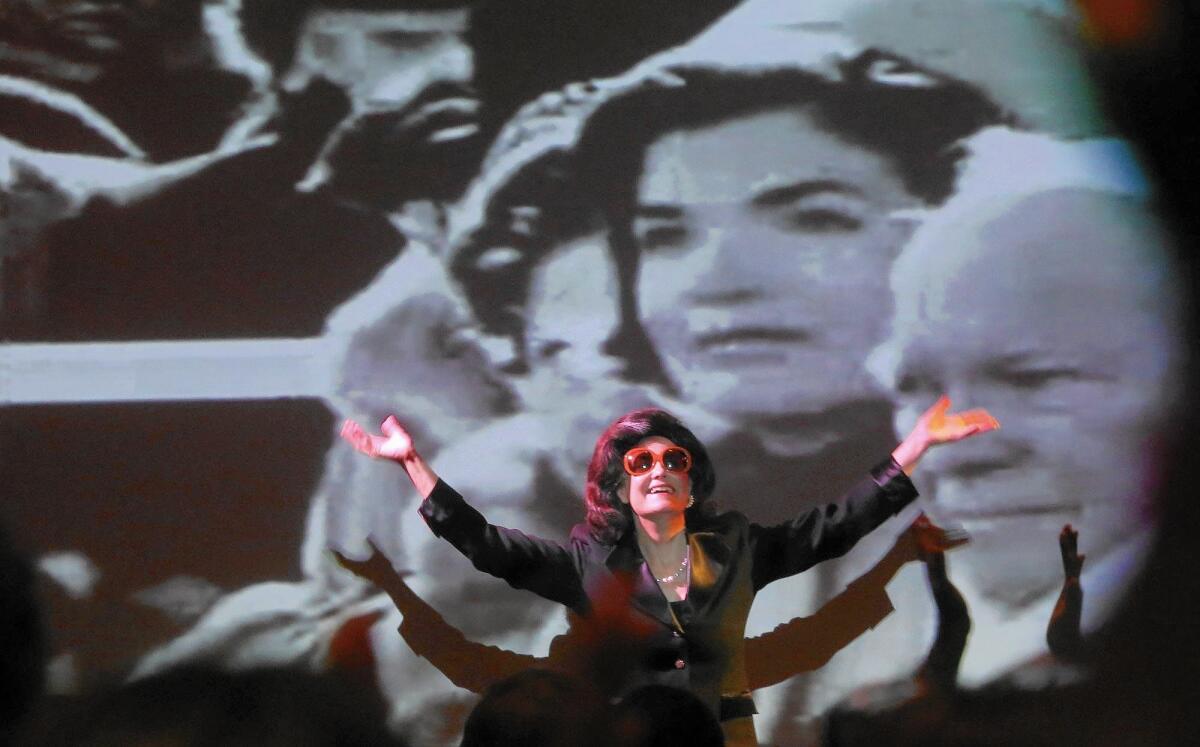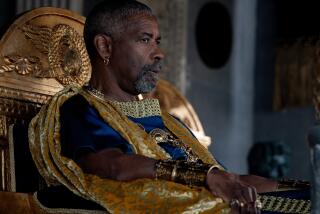Review: Karen Finley’s portrayal of the widowed first lady in ‘The Jackie Look’ kicks off the Broad’s feminist series

- Share via
Although dead now for more than 20 years, Jacqueline Kennedy Onassis came to the Broad museum over the weekend to deliver an art lecture on the culture’s fixation on images of trauma.
This is a topic in which Ms. Onassis is both an expert and an emblem. And as impersonated by the performance artist Karen Finley in “The Jackie Look,” the widowed first lady unleashed her hard-earned wisdom with a distraught intensity that more than once brought her to the edge of a nervous breakdown.
Dressed in a dark jacket, white slacks and sunglasses she later bashfully confessed were Gucci knockoffs, Finley looked as though she were jetting to a Cape Cod charity luncheon directly after her talk. The hair, a bouffant permitted to glamorously relax, hinted that sex hadn’t been banished from Onassis’ 5th Avenue aerie.
But the most effective touch was the sphinx-like expression Finley’s Jackie wore, the frozen half-smile of a woman who knows that every step she takes will be photographed. As a former photojournalist and relentless subject herself, she was only too aware of the permanence of certain images. Those of her in the pink wool suit splattered with the blood of her husband, John F. Kennedy, have been seared into national memory.
This was a posthumous appearance. Finley’s Jackie thanked her son, John F. Kennedy Jr., for having the courtesy to die after her. (How much tragedy can one woman bear?) And she kept coming back to Michelle Obama, the first woman in the White House to rival her as a style icon — a subject that filled her with admiration as well as with sorrow for all that was destroyed on that fateful day in Dallas.
Finley’s performance inaugurated the Broad’s “The Tip of Her Tongue” series that will bring feminist artists to perform at the museum. It was an apt locale for “The Jackie Look.” One flight above the Oculus Hall, where the show played Friday and Saturday, hangs Andy Warhol’s “Twenty Jackies” repetitively showing the young widow standing in front of a uniformed guard as President Kennedy is laid to rest.
In a video prelude, Finley’s Jackie rode the Broad’s steep escalator to the third floor, where she took a selfie in front of the Warhol. In a winkingly self-referential moment to her own controversial history as an artist infamously denied funding by the National Endowment for the Arts on moral grounds, she paid homage to Barbara Kruger’s untitled work containing the words “Your body is a battleground.”
This playful introduction set up expectations that weren’t always fulfilled by the piece, the bulk of which consisted of Finley lecturing from notes that too often seemed cobbled together from critical studies books you might find in the lobby of REDCAT. The overly explanatory tone of the language reminded me also of some of the Broad’s didactic panels, which presume to tell you how a given work will make you feel — a clunky trend in modern curating that undermines the unrestricted power of art.
Finley doesn’t need academic prose to bolster her authority. She is at her most persuasive when most wayward. The most memorable parts of “The Jackie Look” weren’t when she was elucidating the way Onassis has come to serve our cathartic need for a soignée image of catastrophe and survival.
It was when Finley herself, in all her emotional extremity, would peek through the Jackie disguise and voice satiric outrage at the transformation of victims into objects of consumption. Her search for assassination memorabilia on EBay would have been hilarious were it not such a damning commentary of the American practice of commodifying everything.
Finley’s Jackie invited a few audience members to the stage to dance along with her to Sylvester’s “You Make Me Feel (Mighty Real),” a song evoking those hedonistic days at Studio 54 where she’d escape the role society had imprisoned her in by taking a little drink and letting loose on the dance floor. Finley’s ecstatic gyrations were more eloquent than any of her earlier jargon.
The most movingly theatrical moment, however, came when Finley’s Jackie defended daughter Caroline’s incessant repetition of the phrase “you know” during a TV interview by chanting the words in a voice that grew hoarse with anger, sadness and disgust over the mockery women are subjected to in the media.
Solo artists like Finley are most potent when acting out meaning. High-minded ideas sound borrowed in her mouth. The first lady of performance art, as she has been dubbed, doesn’t have to continue covering her body in chocolate to grab our attention. But she’s never more dangerous than when wielding herself as a theatrical weapon.
More to Read
The biggest entertainment stories
Get our big stories about Hollywood, film, television, music, arts, culture and more right in your inbox as soon as they publish.
You may occasionally receive promotional content from the Los Angeles Times.











